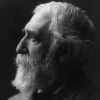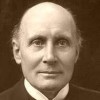And, when the votes are counted, let everybody, including the candidates, get into a good humor as quick as they got into a bad one.
Will Rogers (1879-1935) American humorist
Column (1932-11-07), “Daily Telegram”
(Source)
On the elections to be held the following day, which included the presidential race between Herbert Hoover and Franklin Roosevelt.
Quotations about:
cooperation
Note not all quotations have been tagged, so Search may find additional quotes on this topic.
Nations, like individuals, do not always see alike or think alike, and international cooperation and progress are not helped by any Nation assuming that it has a monopoly of wisdom or of virtue.
Franklin Delano Roosevelt (1882-1945) American lawyer, politician, statesman, US President (1933-1945)
Message (1945-01-06) to Congress, Annual Message (State of the Union)
(Source)
In 1945, Roosevelt delivered the SOTU as a written message to Congress, not as a speech.
Self-restraint, self-mastery, common sense, the power of accepting individual responsibility and yet of acting in conjunction with others, courage and resolution — these are the qualities which mark a masterful people. Without them no people can control itself, or save itself from being controlled from the outside.
Theodore Roosevelt (1858–1919) American politician, statesman, conservationist, writer, US President (1901–1909)
Speech (1910-04-23), “Citizenship in a Republic [The Man in the Arena],” Sorbonne, Paris
(Source)
We were born for cooperation, like feet, like hands, like eyelids, like the rows of upper and lower teeth. So to work against each other is contrary to nature; and resentment and rejection count as working against someone.
[γεγόναμεν γὰρ πρὸς συνεργίαν ὡς πόδες, ὡς χεῖρες, ὡς βλέφαρα, ὡς οἱ στοῖχοι τῶν ἄνω καὶ κάτω ὀδόντων. τὸ οὖν ἀντιπράσσειν ἀλλήλοις παρὰ φύσιν: ἀντιπρακτικὸν δὲ τὸ ἀγανακτεῖν καὶ ἀποστρέφεσθαι.]
Marcus Aurelius (AD 121-180) Roman emperor (161-180), Stoic philosopher
Meditations [To Himself; Τὰ εἰς ἑαυτόν], Book 2, ch. 1 (2.1) [tr. Gill (2013)]
(Source)
(Source (Greek)). Alternate translations:For we are all born to be fellow-workers, as the feet, the hands, and the eyelids; as the rows of the upper and under teeth: for such therefore to be in opposition, is against nature; and what is it to chafe at, and to be averse from, but to be in opposition?
[tr. Casaubon (1634), 1.15]For we are all made for mutual Assistance, no less than the Parts of the Body are for the Service of the whole; From whence it follows that Clashing and Opposition is perfectly Unnatural: Now such an unfriendly Disposition is imply'd in Resentment and Aversion.
[tr. Collier (1701)]We were formed by nature for mutual assistance, as the two feet, the hands, the eye¬ lids, the upper and lower rows of teeth. Opposition to each other is contrary to nature: All anger and aversion is an opposition.
[tr. Hutcheson/Moor (1742)]For we are all born for our mutual assistance; as the hands and feet, and every part of the human body, are for the service of the whole; to thwart and injure each other, therefore, is contrary to nature. Now injuries and hostilities are generally the consequence of hatred and resentment.
[tr. Graves (1792)]For we are made for co-operation, like feet, like hands, like eyelids, like the rows of the upper and lower teeth. To act against one another, then, is contrary to nature; and it is acting against one another to be vexed and to turn away.
[tr. Long (1862)]For we are all made for mutual assistance, as the feet, the hands, and the eyelids, as the rows of the upper and under teeth, from whence it follows that clashing and opposition is perfectly unnatural. Now such an unfriendly disposition is implied in resentment and aversion.
[tr. Collier/Zimmern (1887)]For we are made for co-operation, like the feet, the hands, the eyelids, the upper and the lower rows of teech. To thwart one another is contrary to nature; and one form of thwarting is resentment and estrangement.
[tr. Rendall (1898)]For we are made by nature for mutual assistance, like the feet, the hands, the eyelids, the upper and lower rows of teeth. It is against nature for men to oppose each other; and what else is anger and aversion?
[tr. Hutcheson/Chrystal (1902)]For we have come into being for co-operation, as have the feet, the hands, the eyelids, the rows of upper and lower teeth. Therefore to thwart one another is against Nature; and we do thwart one another by shewing resentment and aversion.
[tr. Haines (Loeb) (1916)]For we have come into the world to work together, like feet, like hands, like eyelids, like the rows of upper and lower teeth. To work against one another therefore is to oppose Nature, and to be vexed with another or to turn away from him is to tend to antagonism.
[tr. Farquharson (1944)]For he and I were born to work together, like a man’s two hands, feet, or eyelids, or like the upper and lower rows of his teeth. To obstruct each other is against Nature’s law -- and what is irritation or aversion but a form of obstruction?
[tr. Staniforth (1964)]For we have come into being to work together, like feet, hands, or eyelids, or the two rows of teeth in our upper and lower jaws. To work against one another is therefore contrary to nature; and to be angry with another and turn away form him is surely to work against him.
[tr. Hard (1997 ed.)]We were born to work together like feet, hands, and eyes, like the two rows of teeth, upper and lower. To obstruct each other is unnatural. To feel anger at someone, to turn your back on him: these are obstructions.
[tr. Hays (2003)]We were born for cooperation, like feet, like hands, like eyelids, like the rows of upper and lower teeth. So to work in opposition to one another is against nature: and anger or rejection is opposition.
[tr. Hammond (2006)]For we have been made for cooperation, just like the feet, the hands, the eyelids, and the upper and lower teeth. To hinder one another, then, is contrary to Nature, and this is exactly what happens when we are angry and turn away from each other.
[tr. Needleman/Piazza (2008)]For we have come into being to work together, like feet, hands, eyelids, or the two rows of teeth in our upper and lower jaws. To work against one another is therefore contrary to nature; and to be angry with another person and turn away from him is surely to work against him.
[tr. Hard (2011 ed.)]For both they and I need each other. To act against them would be to act against myself. And to become angry and turn away from them is also to act against them.
[tr. McNeill (2019)]
Greed is not good. Being rapacious doesn’t make you a capitalist, it makes you a sociopath. And in an economy as dependent upon cooperation at scale as ours, sociopathy is as bad for business as it is for society.
Nick Hanauer (b. 1959) American entrepreneur and venture capitalist [Nicolas Joseph Hanauer]
Lecture (2019-07) “The Dirty Secret of Capitalism — and a New Way Forward,” TEDsummit, Edinburgh
(Source)
(Source (Video), 14:19)
Instinctively we divide mankind into friends and foes — friends, towards whom we have the morality of co-operation; foes, towards whom we have that of competition. But this division is constantly changing; at one moment a man hates his business competitor, at another, when both are threatened by Socialism or by an external enemy, he suddenly begins to view him as a brother. Always when we pass beyond the limits of the family it is the external enemy which supplies the cohesive force. In times of safety we can afford to hate our neighbour, but in times of danger we must love him.
Bertrand Russell (1872-1970) English mathematician and philosopher
Authority and the Individual, Lecture 1 (1949)
(Source)
Collection, with some edits, of the inaugural Reith Lectures, BBC, "Authority and the Individual," No. 1 "Social Cohesion and Human Nature" [14:16] (1948-12-26).
And so when I hear so much impatient and irritable complaint, so much readiness to replace what we have by guardians for us all, those supermen, evoked somewhere from the clouds, whom none have seen and none are ready to name, I lapse into a dream, as it were. I see children playing on the grass; their voices are shrill and discordant as children’s are; they are restive and quarrelsome; they cannot agree to any common plan; their play annoys them; it goes poorly. And one says, let us make Jack the master; Jack knows all about it; Jack will tell us what each is to do and we shall all agree. But Jack is like all the rest; Helen is discontented with her part and Henry with his, and soon they fall again into their old state. No, the children must learn to play by themselves; there is no Jack the master. And in the end slowly and with infinite disappointment they do learn a little; they learn to forbear, to reckon with anther, accept a little where they wanted much, to live and let live, to yield when they must yield; perhaps, we may hope, not to take all they can. But the condition is that they shall be willing at least to listen to one another, to get the habit of pooling their wishes. Somehow or other they must do this, if the play is to go on; maybe it will not, but there is no Jack, in or out of the box, who can come to straighten the game.
Learned Hand (1872-1961) American jurist
“Democracy: Its Presumptions and Realities,” speech, Federal Bar Association, Washington, DC (1932-03-08)
(Source)
Collected in The Spirit of Liberty (1953).
In my humble opinion, noncooperation with evil is as much a duty as is cooperation with good.
Mohandas Gandhi (1869-1948) Indian lawyer, anti-colonial nationalist, political ethicist [Mahatma Gandhi]
Statement at his sedition trial (1922-03-18)
(Source)
Following the riots in Chauri Chaura, India, on 5 February 1922, which killed 22 police officers, Gandhi was arrested for sedition for articles he'd written against the British government in India, in what is called the "Great Trial of 1922." After this statement he was sentenced to six years (serving two).
Gandhi had previously used the same phrase in "The Poet's Anxiety," Young India (1921-06-01), reprinted in Gandhi's Satyagraha, ch. 69 (1961).
(Note: searching out this quotation is complicated by the varied and evolving spellings of non-co-operation, non-cooperation, and noncooperation.)
Competition, as an ideal, had its part to play in the pioneer days of both industrialism and Western agriculture. But its day is past, and a new type of man is needed. The problem of producing goods in sufficient quantities to make general material well-being technically possible was solved by the men of the competitive era. The problem that remains is one of distribution, not of production; it can be solved only by economic justice, not by economic war. For this problem, the mentality of the competitive era is unfitted, since it is only to be solved by co-operation.
Bertrand Russell (1872-1970) English mathematician and philosopher
“Competitive Ethics,” New York American (1934-03-19)
(Source)
PERICLES:But thou know’st this:
’Tis time to fear when tyrants seems to kiss.William Shakespeare (1564-1616) English dramatist and poet
Pericles, Act 1, sc. 2, l. 84ff (1.1.84-86) (1607) [with George Wilkins]
(Source)
Our democracy is not the buildings, not the monuments. It’s you being willing to work to make things better and being willing to listen to each other and argue with each other and come together and knock on doors and make phone calls and treat people with respect.
Barack Obama (b. 1961) American politician, US President (2009-2017)
Staff Farewell, Joint Base Andrews, Maryland (20 Jan 2017)
(Source)
If lawyers had followed the norm of no execution without trial, if doctors had accepted the rule of no surgery without consent, if businessmen had endorsed the prohibition of slavery, if bureaucrats had refused to handle paperwork involving murder, then the Nazi regime would have been much harder pressed to carry out the atrocities by which we remember it.
Timothy Snyder (b. 1969) American historian, author
On Tyranny: Twenty Lessons from the Twentieth Century (2017)
(Source)
But since, as Plato has admirably expressed it, we are not born for ourselves alone, but our country claims a share of our being, and our friends a share; and since, as the Stoics hold, everything that the earth produces is created for man’s use; and as men, too, are born for the sake of men, that they may be able mutually to help one another; in this direction we ought to follow Nature as our guide, to contribute to the general good by an interchange of acts of kindness, by giving and receiving, and thus by our skill, our industry, and our talents to cement human society more closely together, man to man.
[Sed quoniam, ut praeclare scriptum est a Platone, non nobis solum nati sumus ortusque nostri partem patria vindicat, partem amici, atque, ut placet Stoicis, quae in terris gignantur, ad usum hominum omnia creari, homines autem hominum causa esse generatos, ut ipsi inter se aliis alii prodesse possent, in hoc naturam debemus ducem sequi, communes utilitates in medium afferre mutatione officiorum, dando accipiendo, tum artibus, tum opera, tum facultatibus devincire hominum inter homines societatem.]
Marcus Tullius Cicero (106-43 BC) Roman orator, statesman, philosopher
De Officiis [On Duties; On Moral Duty; The Offices], Book 1, ch. 7 (1.7) / sec. 22 (44 BC) [tr. Miller (1913)]
(Source)
Original Latin. Referring to Plato, Epistle 9, to Archytas: "No one of us exists for himself alone, but one share of our existence belongs to our country, another to our parents, a third to the rest of our friends, while a great part is given over to those needs of the hour with which our life is beset." [tr. Bury (1966)]
Alternate translations:"But seeing (as is excellently said by Plato) we are not born for ourselves alone; but that our native country, our friends and relations, have a just claim and title to some part of us;" and seeing whatsoever is created on earth was merely designed (as the Stoics will have it) for the service of men; and men themselves for the service, good, and assistance of one another; we certainly in this should be followers of Nature, and second her intentions; and by producing all that lies within the reach of our power for the general interest, by mutually giving and receiving good turns, by our knowledge, industry, riches, or other means, should endeavour to keep up that love and society, that should be amongst men.
[tr. Cockman (1699)]But, according to the excellent observation of Plato, "since we were not born for ourselves alone, our country and our friends have separate claims upon us." The produce of the earth, according to the Stoics, is intended wholly for the use of man; but men were designed for the service of men, by being made able to communicate reciprocal benefits to each other. In this view we ought to follow nature as our guide; and, by the exchange of services, by giving and receiving, to bring forward general advantages for the common good. We ought, by knowledge, industry, and wealth, to bind closer the society of men with men.
[tr. McCartney (1798)]But (as has been strikingly said by Plato) we are not born for ourselves alone, and our country claims her share, and our friends their share of us; and, as the Stoics hold, all the earth produces is created for the used of man, so men are created for the sake of men, that they may mutually do good to one another; in this we ought to take nature for our guide, to throw into the public stock the offices of general utility by a reciprocation of duties; sometimes by receiving, sometimes by giving, and sometimes to cement human society by arts, by industry, and byh our resources.
[tr. Edmonds (1865)]But since, as it has been well said by Plato, we are not born for ourselves alone; since our country claims a part in us, our parents a part, our friends a part; and since, according to the Stoics, whatever the earth bears is created for the use of men, while men were brought into being for the sake of men, that they might do good to one another, -- in this matter we ought to follow nature as a guide, to contribute our part to the common good, and by the interchange of kind offices, both in giving and receiving, alike by skill, by labor, and by the resources at our command, to strengthen the social union of men among men.
[tr. Peabody (1883)]But since our life, to quote the noble words of Plato, has not been given to us for ourselves alone (for our country claims a share, our friends another), and since, as the Stoics hold, all the products of the earth are destined for our use and we are born to help one another, we should here take nature for our guide and contribute to the public good by the interchange of acts of kindness, now giving, now receiving, and ever eager to employ our talents, industry and resources in strengthening the bonds of human society.
[tr. Gardiner (1899)]Plato wrote brilliantly on this point: "We have not been born for ourselves alon; our native land claims a portion of our origin, our friends claim a portion." The Stoics like to repeat that everything that comes into being in the world is created for the benefit of man, that even men themselves are born for mankind's sake, that people can be helpful among themselves, one to another. The Stoics say that we should follow nature's lead in this and that we should contribute to the public benefit by the mutual interchange of obligations, by both giving and receiving. By our skills, by our efforts, by our capacities we should thus link men together into a human society.
[tr. Edinger (1974)]
If a predatory enemy to our species can’t unite everyone on Earth to fight it, I’m left wondering what hope remains for Civilization.
Neil deGrasse Tyson (b. 1958) American astrophysicist, author, orator
Twitter (19 Apr 2020)
(Source)
Regarding the COVID-19 pandemic.
A system must be managed. It will not manage itself. Left to themselves in the Western world, components become selfish, competitive, independent profit centres, and thus destroy the system. The secret is cooperation between components toward the aim of the organization. We can not afford the destructive effect of competition.
W. Edwards Deming (1900-1993) American management consultant, educator
The New Economics for Industry, Government, Education, ch. 3 “Introduction to a System” (1993)
(Source)
Love is a great force in private life; it is indeed the greatest of all things: but love in public affairs simply does not work. It has been tried again and again: by the Christian civilisations of the Middle Ages, and also by the French Revolution, a secular movement which reasserted the Brotherhood of Man. And it has always failed. The idea that nations should love one another, or that business concerns or marketing boards should love one another, or that a man in Portugal, say, should love a man in Peru of whom he has never heard—it is absurd, it is unreal, worse, it is dangerous. It leads us into perilous and vague sentimentalism. “Love is what is needed,” we chant, and then sit back and the world goes on as before. The fact is we can only love what we know personally. And we cannot know much. In public affairs, in the rebuilding of civilisation, something much less dramatic and emotional is needed, namely, tolerance.
E. M. Forster (1879-1970) English novelist, essayist, critic, librettist [Edward Morgan Forster]
“The Unsung Virtue of Tolerance,” radio broadcast (Jul 1941)
(Source)
Published as "Tolerance," Two Cheers for Democracy (1951)
The main ingredient of stardom is the rest of the team.
John Wooden (1910-2010) American basketball player and coach
They Call Me Coach, ch. 25, epigraph (1972)
(Source)
Difference must be not merely tolerated, but seen as a fund of necessary polarities between which our creativity can spark like a dialectic. Only then does the necessity for interdependency become unthreatening. Only within that interdependency of different strengths, acknowledged and equal, can the power to seek new ways of being in the world generate, as well as the courage and sustenance to act where there are no charters.
Audre Lorde (1934-1992) American writer, feminist, civil rights activist
“The Master’s Tools Will Never Dismantle the Master’s House” (1979)
(Source)
The way chosen by the United States was plainly marked by a few clear precepts, which govern its conduct in world affairs.
First: No people on earth can be held, as a people, to be enemy, for all humanity shares the common hunger for peace and fellowship and justice.
Second: No nation’s security and well-being can be lastingly achieved in isolation but only in effective cooperation with fellow-nations.
Third: Any nation’s right to form of government and an economic system of its own choosing is inalienable.
Fourth: Any nation’s attempt to dictate to other nations their form of government is indefensible.
And fifth: A nation’s hope of lasting peace cannot be firmly based upon any race in armaments but rather upon just relations and honest understanding with all other nations.
United we stand, divided we fall.
Aesop (620?-560? BC) Legendary Greek storyteller
Fables [Aesopica], “The Four Oxen and the Lion” (6th C BC) [tr. Jacobs (1894)]
(Source)
Don’t spit in the soup. We’ve all got to eat.
Lyndon B. Johnson (1908-1973) American politician, educator, US President (1963-69)
(Attributed)
A favorite political comment of Johnson's, going back at least as far as when he was US Senate majority leader. It's sometimes labeled as an old adage from Texas politics.
The core metaphor of "spitting in the soup" (ruining/sabotaging something) long predates Johnson; the phrase's application to politics ("don't make things so toxic or failed that you hurt your colleagues and the political institution itself") seems more applicable than ever.
The connection to Johnson seems to have solidified with its inclusion in Jack Shepherd, Christopher Wren, eds., Quotations from Chairman LBJ, Epigraph (1968).
As a verbal comment, and given folk wanting to elicit (or mock) Johnson's Texas accent, variants include "we all got to eat," "we've all gotta eat," etc.
There are no problems which we cannot solve together, and very few that any of us can settle by himself.
Lyndon B. Johnson (1908-1973) American politician, educator, US President (1963-69)
Speech (1964-11-28), Press Conference, LBJ Ranch, Johnson City, Texas
(Source)
Regarding the Atlantic Alliance (NATO). Variant: "There are no problems we cannot solve together, and very few that we can solve by ourselves."
Politics makes strange bed-fellows.
Charles Dudley Warner (1829–1900) American essayist and novelist
My Summer in a Garden, “Fifteenth Week” (1871)
(Source)
And we must face the fact that the United States is neither omnipotent or omniscient — that we are only six percent of the world’s population — that we cannot impose our will upon the other ninety-four percent of mankind — that we cannot right every wrong or reverse each adversity — and that therefore there cannot be an American solution to every world problem.
To accept passively an unjust system is to cooperate with that system; thereby the oppressed become as evil as the oppressor. Non-cooperation with evil is as much a moral obligation as is cooperation with good. The oppressed must never allow the conscience of the oppressor to slumber. Religion reminds every man that he is his brother’s keeper. To accept injustice or segregation passively is to say to the oppressor that his actions are morally right. It is a way of allowing his conscience to fall asleep. At this moment the oppressed fails to be his brother’s keeper. So acquiescence — while often the easier way — is not the moral way. It is the way of the coward.
Martin Luther King, Jr. (1929-1968) American clergyman, civil rights leader, social activist, preacher
Stride Toward Freedom, ch. 11 “Where Do We Go from Here?” (1958)
(Source)
I have seen a man of genius who made one think if other men were like him, cooperation were impossible. Must we always talk for victory, and never once for truth, for comfort, and joy?
Ralph Waldo Emerson (1803-1882) American essayist, lecturer, poet
“Table Talk,” American Life, lecture, Boston (1864-12-18)
(Source)
Speaking of Thoreau's style of conversation. Originally a Journal entry of 29 Feb 1856. Also part of the lecture "Social Aims".
Perfectionism, no less than isolationism or imperialism or power politics, may obstruct the paths to international peace. Let us not forget that the retreat to isolationism a quarter of a century ago was started not by a direct attack against international cooperation but against the alleged imperfections of the peace.
In our disillusionment after the last war we preferred international anarchy to international cooperation with Nations which did not see and think exactly as we did. We gave up the hope of gradually achieving a better peace because we had not the courage to fulfill our responsibilities in an admittedly imperfect world.
We must not let that happen again, or we shall follow the same tragic road again — the road to a third world war.
A player who makes a team great is better than a great player.
John Wooden (1910-2010) American basketball player and coach
“The Prodigy” (2003)
(Source)
IBM Linux commercial.
No member of a crew is praised for the rugged individuality of his rowing.
Alfred North Whitehead (1861-1947) English mathematician and philosopher
“Harvard: The Future,” sec. 5, The Atlantic Monthly (Sep 1936)
(Source)
Reprinted in Essays in Science and Philosophy, Part 3 (1947). Often misattributed to Ralph Waldo Emerson.


























